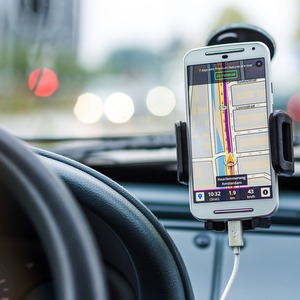The scientists of Samara University are developing the service that will make it easier to navigate in the megapolis and build the most comfortable road routes. Innovation is carried out within the grant of the Ministry of Education and Science of the Russian Federation on the programme of supporting applied research and experimental development.
A team of scientists from Samara University is working on the project called "Personal Digital Motor Transport Assistant" under the guidance of Professor of the Department of Geoinformatics and Information Security Vladislav Myasnikov.
Using the methods of machine learning the developers offer to create a virtual profile of the traffic participant, which aggregates the data on personal preferences and habits and with the help of which the digital assistant will select the most convenient route for a particular person. The application will be integrated with the mobile service "Pribyvalka-63", which was created earlier by the authors of the project and now is in demand in Samara.
"Thinking about the expansion of the functionality of "Pribyvalka-63 ", which has more than 200,000 active users, we came to the conclusion that the optimal route from point "A" to point "B" is different for each person. Someone does not like to stand in traffic jams, someone on the contrary wants to wait out the traffic jam not to get nervous, someone will necessarily turn to the embankment on their way – just to admire the Volga, – says one of the service developers, researcher of Institute of IT, Mathematics and Electronics, Associate Professor of Samara University Andrey Chernov. – But there are objective criteria in the transport strategy. The main criterion is to reach the goal with the maximum probability and do it on time".
The scientists offer not only to adjust the service to the habits and requirements of a particular person, but also to "teach" a personal transport assistant to take into account the forecast of the road situation.
"Using the methods of machine learning, the user’s road strategy is analyzed: what kind of transport he prefers to use, what "points of attraction" are indicated in his route, what are his behavioural features. For example, the motorist adheres to major highways or avoids left turns, – Vladislav Myasnikov says about the individual characteristics of the traffic participant conduct. – After the analysis of preferences, the mobile service will offer transportation options that suit this person. That means, the way will be paved taking into account implicit preferences". As an example of the obvious preferences of the user may be the shortest path. The developers say that it will be calculated on the basis of the cost of travel on this or that segment of the road transport network. In its turn, it can be calculated taking into account the amount of consumed fuel.
The digital motor transport assistant will also take into account the time of arrival at the public transport stop. This will allow the citizens to calculate the exact time of their travels in the megapolis. "When people choose what kind of transport is better to reach the destination, they take into account the time of the trip to the stop, the waiting time at the stop and the time of the trip itself," – Andrey Chernov gives an example. – That is, choosing between public transport routes, people consider not only the most convenient, but also the one that operates more often. Very few people like to wait".
Besides, "smart service" will calculate the optimal time before the public transport stops through the collection of statistics and ascertaining the speed of movement of the user. It is clear that the calculation of travel time for the grandmother will differ from that for the adolescent.
The service will also take into account individual characteristics not only of pedestrians, but also of car owners. " Example: There is an SUV and an urban compact car. The navigator offers them a route without taking into account its passableness. Although in any Russian megapolis there are streets that will become a "road of life" for an urban compact car. An SUV will cope with hummocks and potholes, – Andrey Chernov provides a visible example. – After collecting the statistics, the smart program will analyze: if the driver uses this passage, he is able to overcome all the hardships of the road. That means that he can be offered the most difficult route in terms of road coverage".
For reference
The mobile application "Pribyvalka-63" is one of the first experiences of the analysis of the urban transport flow in Russia. The scientists of Samara University are ready to fill this service with new functionality within the project "Personal Digital Motor Transport Assistant", carried out with the financial support of the Ministry of Education and Science of Russia (Project No. 14.575.21.0177).
In early 2019, the developers will purchase the necessary equipment for this: storing and analyzing of trackers and users statistics will need to create a separate cluster of high-performance computers equipped with modern graphics processors with a CUDA architecture, as well as a "large data" processing system. The developers will offer the first solutions in 2019. In general, the project is designed for three years. "Personal Digital Motor Transport Assistant" is being developed for geo-information characteristics of Samara, but potentially it can be projected to any Russian city with more than a million of people.
